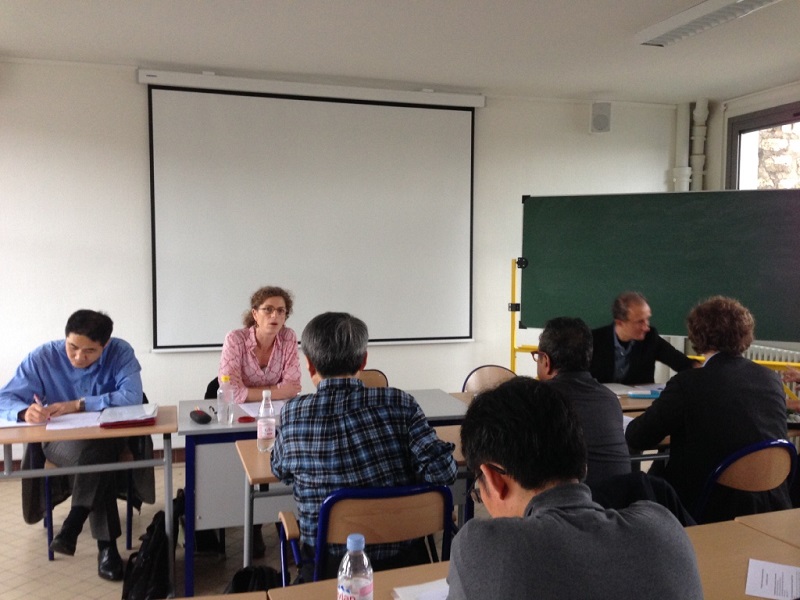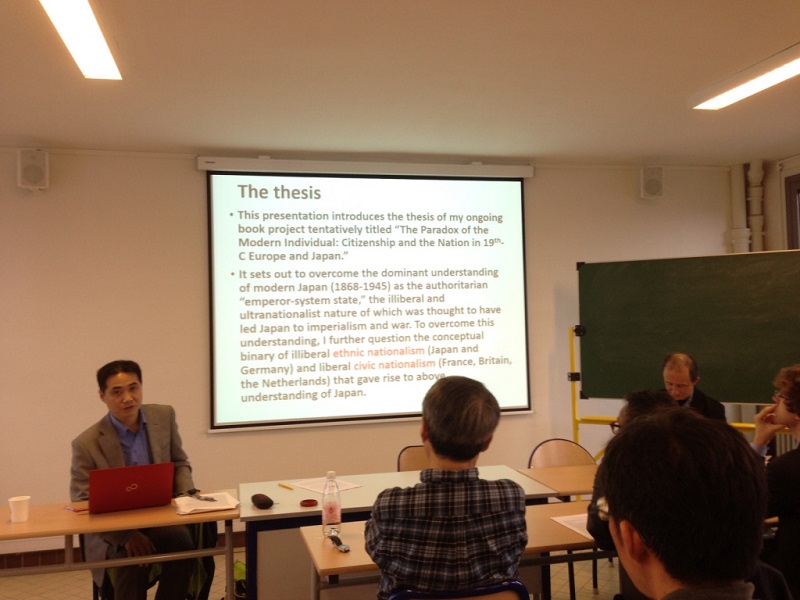2015.11.19
GHC共同研究セミナー GHC Joint Seminar in Paris (4-6 Nov. 2015)
2015年11月4日から6日、パリの社会科学高等研究院で、GHCのワークショップが開催された。以下にそのプログラムを記す。
11月4日(水)
Joint event with the seminar: The Value of Human Being, ESOPP-CRH group
Round table around Jeremy Adelman, "Thinking about Inequality: A Global History"
Jeremy Adelman, Introduction
Commentators:
Andreas Eckert, Humboldt University
Ines Zupanov, CNRS and EHESS
Jean- Fréderic Schaub, EHESS
11月5日(木)
午前(司会:Jeremy Adelman)
Antonella Romano, EHESS (Koyré Center), Globality and temporalities: what the 16th century tell us.
HANEDA Masashi, the University of Tokyo, The Paradox of Asymmetry. Language as a Scale.
Etienne de la Vaissière, EHESS (Cetobac), Early Global Points of View.
SHIMADA Ryuto, the University of Tokyo, Describing the Early Modern World: Temporal and Spatial Analytical Problems and Solutions in Using the Dutch East India Company Records
午後(司会:羽田正)
Nancy Green, EHESS, CRH, A Century of Transnationalism: Immigration History and Historiography
MURAKAMI Ei, Kyoto University, Maritime History of Modern China
OTA Atsushi, Hiroshima University, Piracy and Anti-Piracy Campaigns in Global History
Gyan Prakash, Princeton, Urban Form and Scale: Bombay, 1860-1940
11月6日(金)
Joint event with the Global History Collaborative project (GHC) advanced seminar: Knowledge, Institution, Economies. Connected histories and global dynamics.
Corinne Lefevre, EHESS and CNRS (CEIAS) The Mughals of India: imperial competition and cosmopolitanism
ZHONG Yijiang, the University of Tokyo, Citizen, Nation, and the Constitutional State in 19th-century Europe and Japan
Marc Elie, CNRS (Cercec), How to re-integrate the Soviet experience in the
transnational history of environmental concerns and mobilizations
(last third of the 20th century)
Xavier Paulès, The worldwide dissemination of the Chinese game of fantan 番攤, 1850-1950
4日は、Adelman教授が、inequalityをキーワードとする近現代史の解釈(19世紀から現代)を示し、これに対して、4人の研究者がコメントを加え、それにAdelman教授が応答するというラウンドテーブル形式の研究会だった。4人の研究者はあらかじめ提出されていたペーパーを丁寧に読んだ上で、十分に準備されたかなり長めのコメントを用意していた。このため、議論がよくかみあい、近現代史上の重要な出来事の価値や解釈、時代区分の方法、Adelman教授の報告には取り上げられなかった事項の評価などをめぐって高度な議論の応酬があった。報告時間1時間、討論時間3時間の長大な、しかしきわめて充実したセッションだった。
5日は、GHC東京拠点のメンバー4名とEHESSの研究者3名、それにプリンストン拠点のメンバー1名が、歴史研究におけるscaleの問題に、各々の立場からアプローチした成果を報告した。報告とそれに対する質問やコメントは多岐にわたったが、空間の単位や時間の区切り、歴史主体など、scaleにかかわる主題について、また、主権、国家、移民、海賊行為など歴史叙述を行う際の用語や概念などについて、様々な見方や意見が披露された。これらはすべてグローバルヒストリー研究の方法論の中核をなす点であり、今後もGHCの様々なイベントを通じて、継続的に議論されることになるだろう。
6日は、4人の研究者がみずからの最近の研究成果をグローバルヒストリーとの関連で紹介した。ムガル帝国とその社会の特徴、日本の近代化の解釈、ソ連の科学者の環境問題への対応、それに中国南部に特徴的な簡単なゲームの世界大への拡大と、主題はバラバラだが、共通していたのは、自らの主題をグローバルヒストリーとしてどのように扱うかを真剣に考える報告者の姿勢だった。
ベルリン拠点のメンバーは5日午前のセッションまでしか参加できなかったが、それでも、9月のサマースクールに続いて、4つの拠点の主要研究者が、互いの問題関心をよく理解したうえで濃密な議論のときを共有できた。4日と6日は、EHESSの授業の一環として開催されたので、数多くの大学院学生が出席していた。昨年度EHESSから東京拠点を訪れた学生や9月のサマースクールに参加した学生、それにGHCの東京拠点からパリ拠点に派遣された大学院学生は、とりわけ熱心にセッションに参加していた。GHCのネットワークが本格的に機能し始めてきていることを強く感じるイベントとなった。
(文責 羽田正)
The Global History Collaborative (GHC) Workshop was held from November 4 to 6, 2015, at the School for Advanced Studies in the Social Sciences (EHESS), Paris. Its program is as follows:
November 4th (Wednesday)
Joint event with the seminar: The Value of Human Being, ESOPP-CRH group
Round table around Jeremy Adelman, “Thinking about Inequality: A Global History”
Jeremy Adelman, Introduction
Commentators:
Andreas Eckert, Humboldt University
Ines Zupanov, CNRS and EHESS
Jean-Frédéric Schaub, EHESS
November 5th (Thursday)
Morning (Moderator: Jeremy Adelman)
Antonella Romano, EHESS (Koyré Center), Globality and Temporalities: What the 16th Century Tells Us
HANEDA Masashi, the University of Tokyo, The Paradox of Asymmetry, Language as a Scale
Etienne de la Vaissière, EHESS (Cetobac), Early Global Points of View
SHIMADA Ryuto, the University of Tokyo, Describing the Early Modern World: Temporal and Spatial Analytical Problems and Solutions in Using the Dutch East India Company Records
Afternoon (Moderator: Masashi Haneda)
Nancy Green, EHESS, CRH, A Century of Transnationalism: Immigration History and Historiography
MURAKAMI Ei, Kyoto University, Maritime History of Modern China
OTA Atsushi, Hiroshima University, Piracy and Anti-Piracy Campaigns in Global History
Gyan Prakash, Princeton, Urban Form and Scale: Bombay, 1860-1940
November 6th (Friday)
Joint event with the GHC project advanced seminar: Knowledge, Institution, Economies, Connected Histories and Global Dynamics
Corinne Lefevre, EHESS and CNRS (CEIAS) The Mughals of India: Imperial Competition and Cosmopolitanism
ZHONG Yijiang, the University of Tokyo, Citizen, Nation, and the Constitutional State in 19th-century Europe and Japan
Marc Elie, CNRS (Cercec), How to Re-integrate the Soviet Experience in the Transnational History of Environmental Concerns and Mobilizations (last third of the 20th century)
Xavier Paulès, The Worldwide Dissemination of the Chinese Game of Fan-tan 番攤, 1850-1950
On November 4th, a round-table workshop was held in which Professor Adelman provided an interpretation of modern and contemporary history (from the 19th century until the present) around the keyword of “inequality,” which was followed by comments submitted by the four researchers and then the responses from Professor Adelman. The four researchers had carefully read the paper submitted beforehand and arrived with quite extensive, well-prepared comments. The discussion thus came together well, with some high-quality arguments exchanged over topics such as the value and interpretation of significant events in recent history, approaches to the periodization, and the evaluation of some topics not raised in Professor Adelman’s report. With a one-hour presentation followed by three hours of debate, this was a prolonged but highly engaging session.
On November 5th, four members of the GHC Tokyo hub, three researchers from the EHESS, and one member of the Princeton hub presented results of their individual approaches to the issue of scale in historical research. Each presentation, along with the questions and comments they elicited, covered a broad range of subjects, uncovering a diversity of views and opinions on key issues of historical scale, such as spatial and temporal limits and historical actors, as well as around some terms and concepts used in historical description: sovereignty, state, immigration, and piracy. Each of these form central issues within the methodology of global history studies and will likely be the subjects of continued debate throughout future GHC events.
On November 6th, four researchers introduced their own research outcomes in connection with global history. The presentations covered subjects as diverse as the characteristics of the Mughal Empire and its society, an interpretation of Japan’s modernization, the responses of Soviet scientists toward environmental problems, and the global spread of a simple game characteristic of southern China. Common to each, however, was the serious attempt of each presenter to grapple with his/her chosen subject in terms of global history.
Although members from Berlin were able to attend the workshop only up until the second day’s morning session, following on from the Summer School in September, the main researchers from the four GHC hubs were able to share rich discussions based on their mutual scholarly interests. The sessions on the 4th and 6th were held as part of EHESS classes, with many graduate students in attendance. Participation in these sessions was particularly energetic amongst the EHESS students who visited the Tokyo hub and those who participated in the Summer School in September, and also amongst the graduate students sent to Paris from the Tokyo hub. The event gave a clear impression that the network amongst the GHC members is beginning to function in earnest. (HANEDA Masashi)













